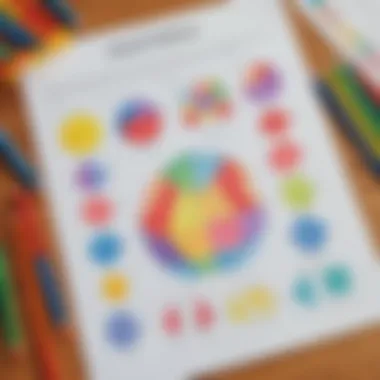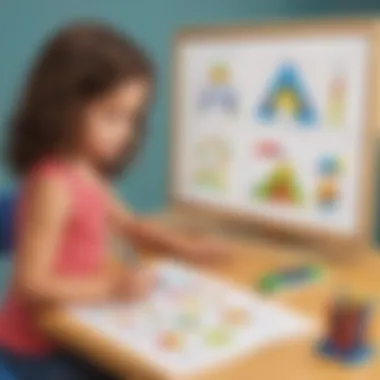Exploring Worksheet Maths for Kindergarten: A Comprehensive Guide


Intro
Worksheet maths for kindergarten students serves as a critical foundation for their future academic success. Early math education plays a vital role in shaping children's cognitive abilities and promoting problem-solving skills. In this exploration, we will uncover the various types of math worksheets tailored for young learners, practical strategies for their implementation, and the essential part parents and educators can play in fostering a positive relationship with numbers.
Through engaging activities and structured worksheets, children can cultivate their numeracy skills in an enjoyable way. This not only enhances their mathematical understanding but also instills a lifelong appreciation for learning. Let’s dive into the creative activities that can bring math to life for kindergarten students.
Creative Activities
Creative activities are a fantastic way to engage young children in math. They can learn foundational skills while having fun. Here, we present several craft ideas along with their educational value:
Craft Ideas
- Counting Beads Necklace: Provide children with colorful beads and string. They can count beads while making a necklace, reinforcing number recognition and counting skills.
- Shape Hunt Collage: Ask children to find and cut out shapes from magazines. They can glue these onto paper, learning to identify and classify shapes in their environment.
- Numbered Puppets: Create puppets using paper bags. Assign each puppet a number. This encourages recognition of numbers and basic addition or subtraction when using them in plays.
Step-by-Step Guides
- Counting Beads Necklace
- Shape Hunt Collage
- Numbered Puppets
- Gather beads of different colors.
- Provide a length of string and show children how to tie a knot at one end.
- Encourage children to count while threading beads onto the string.
- Tie off the end once complete.
- Give children scissors and magazines.
- Instruct them to look for specific shapes and cut them out.
- Guide them to arrange these shapes on a large sheet of paper.
- Discuss what shapes they found.
- Provide paper bags, markers, and craft supplies.
- Help children create puppets by drawing and decorating.
- Assign a number to each puppet.
- Utilize these puppets for simple math story scenarios.
Educational Value
Engaging in these creative activities helps to develop fine motor skills and enhances cognitive processes related to numeracy. When children engage with hands-on crafting, they cultivate a deeper understanding of mathematical concepts like counting, shape recognition, and basic operations.
Fun Quizzes
Fun quizzes can provide an interactive approach to reinforce learning. Here's how these quizzes contribute to a child's math education:
Quiz Topics
The quizzes available on sites like ElemFun cover topics such as:
- Basic Addition and Subtraction
- Number Recognition
- Shape Identification
Question Types
The quizzes incorporate a variety of question types including:
- Multiple Choice
- Fill in the Blanks
- True or False
This variety keeps children engaged and allows for different ways to demonstrate their knowledge.
Knowledge Reinforcement
Quizzes play a significant role in reinforcing what children have learned. By answering questions and receiving feedback, they can identify areas needing improvement and gain confidence in their abilities.
Fact-Based Articles
Fact-based articles provide another layer of learning for young students. They can offer informative content in an accessible manner:
Topics
These articles cover a diverse range of subjects, making math relatable and interesting. Topics may include:
- The importance of numbers in everyday life.
- Their application in various industries.
Engaging Content


The articles present information clearly with engaging visuals that help maintain a child’s interest. Simple language ensures comprehension without overwhelming young readers.
Understanding the Importance of Early Math Education
Mathematics is more than just numbers and equations; it plays a vital role in a child’s cognitive growth and future learning. Early math education serves as a cornerstone, influencing various life skills such as problem-solving, reasoning, and critical thinking. It is essential to create an environment that fosters early mathematical understanding through engaging and effective methods, such as worksheets.
Cognitive Development in Early Childhood
Cognitive development in early childhood refers to the processes through which children acquire knowledge, skills, and thinking capabilities. During this stage, children's brains are rapidly developing, making it a critical time for introducing foundational math concepts. Engaging activities, including the use of math worksheets, can promote essential cognitive skills.
Worksheets enhance children's understanding of numbers, shapes, and measurements through repetition and active participation. Children can engage in various tasks that challenge their thinking. For example, worksheets can include counting exercises or simple puzzles, which require children to think logically and systematically. This type of learning stimulates brain activity and strengthens neural connections, facilitating better understanding of mathematical concepts.
Moreover, worksheets can cater to different learning styles. Visual learners benefit from diagrams and pictures, while hands-on learners engage better with interactive tasks. Recognizing these differences helps educators tailor their approach to support every child's cognitive development effectively.
Setting a Foundation for Future Learning
Establishing a solid base in math during kindergarten years is essential for future academic success. Early math skills are directly correlated with proficiency in later subjects, particularly in mathematics. Children who develop strong numeracy skills early on often find advanced math concepts easier to grasp later.
Worksheets can help in this regard by introducing basic concepts in a structured manner. Activities designed for number recognition, addition, and subtraction gently introduce mathematical principles. This structured approach helps children transition smoothly into more complex topics, ensuring they are well-prepared for future learning.
Additionally, positive experiences with early math education can lead to a lifelong appreciation for the subject. Encouraging children to view math as a fun and engaging activity increases their motivation for learning. When children succeed with the help of worksheets, their confidence grows, which lays the groundwork for tackling more challenging topics as they progress through their education.
The significance of early math education cannot be underestimated. It is the key that unlocks a child's potential for understanding complex concepts later in life.
Characteristics of Effective Maths Worksheets
Effective maths worksheets play a crucial role in the educational journey of kindergarten students. They not only facilitate the understanding of mathematical concepts but also engage young minds in a meaningful way. Each worksheet should be designed with specific characteristics that cater to the developmental needs of children. This section will discuss the elements that make maths worksheets effective, focusing on age appropriateness, engagement, and a variety of design formats.
Age Appropriateness and Engagement
When designing maths worksheets for kindergarteners, age appropriateness is paramount. Worksheets must align with the cognitive development stages of young children. This means using simple language and concepts that are relevant to their everyday experiences.
For instance, worksheets involving basic counting can use colorful illustrations of familiar objects, such as apples or toys. Such visual aids help children connect mathematical numbers to tangible items. Moreover, this enhances engagement, as children are more likely to interact with tasks that resonate with their daily life.
Activities should also consider varying attention spans. Incorporating a mix of tasks can maintain interest. For example, alongside number tracing, integrating a fun puzzle can help children stay focused while continuing to learn.
Key considerations for age appropriateness and engagement include:
- Clear and simple wording. Avoid complex instructions that could confuse young learners.
- Familiar imagery. Incorporate pictures that children encounter in their daily lives.
- Interactive elements. Use coloring activities or cut-and-paste operations to keep children involved.
Variety in Worksheet Design and Format
Variety is another important feature of effective maths worksheets. The design and format should not be monotonous. A diverse range of activities sustains interest and intuition while reinforcing learning objectives. For example, worksheets can include:
- Tracing numbers and symbols to promote fine motor skills.
- Matching games that encourage recognition of numbers or shapes.
- Fill-in-the-blank number lines to support pattern recognition and sequencing.
Additionally, the layout should be visually appealing. A cluttered worksheet can overwhelm a child. Instead, using ample white space and a clear structure will guide young learners through each task more naturally. Furthermore, featuring different colors and playful fonts can make the worksheets inviting and enjoyable.
Effective maths worksheets must cater to a child's developmental stage and should be varied in design to maintain interest and engagement.
Types of Maths Worksheets for Kindergarten
Understanding the different types of maths worksheets available for kindergarteners is crucial for fostering essential numeracy skills. These worksheets serve various educational purposes and target multiple areas of early math development. By carefully selecting appropriate worksheets, parents and educators can create engaging learning experiences tailored to the needs of young learners. Here, we outline several key types of maths worksheets that are integral to a child's early mathematical journey.
Number Recognition Worksheets
Number recognition worksheets are fundamental in helping children identify and understand numbers. These worksheets often include activities where children can practice recognizing numbers through tracing, matching, or coloring. By engaging with these exercises, kids become familiar with numeric symbols and their respective values. The benefits are significant:
- Visual Learning: Children can associate numbers visually, enhancing their memory.
- Motor Skills Development: Tracing and writing numbers improves fine motor skills.
- Confidence Building: As children master number recognition, their confidence in math can improve, encouraging further engagement.
Additionally, it's important to provide a variety of formats for these worksheets, including games to keep children interested.


Basic Addition and Subtraction
Basic addition and subtraction worksheets are essential for introducing young learners to simple arithmetic. These worksheets typically feature problems that require children to add or subtract numbers up to a specific limit, often using illustrations or objects to make the concepts clear. The significance of these worksheets includes:
- Concrete Understanding: Visual aids help children grasp the basics of addition and subtraction.
- Critical Thinking: Solving math problems encourages problem-solving and critical thinking skills.
- Foundation for Future Learning: Early mastery of addition and subtraction lays a solid foundation for more advanced mathematical concepts later on.
Using real-world scenarios can make these worksheets even more impactful. For example, children can solve problems related to sharing snacks or toys.
Shapes and Patterns Activities
Worksheets dedicated to shapes and patterns introduce kindergarteners to geometry and spatial awareness. Engaging in activities that involve recognizing, drawing, or sorting shapes helps children develop critical visual and analytical skills. Important aspects of these worksheets include:
- Recognition Skills: Identifying different shapes and patterns sharpens visual recognition.
- Creativity: Activities that require children to create patterns can boost creativity as well as logical thinking.
- Foundation for Geometry: Early exposure to shapes is vital for their future mathematics education, especially in geometry.
Encouraging exploration through hands-on activities, like using blocks or drawing, enhances the learning experience.
Measurement and Comparison Exercises
Measurement and comparison worksheets introduce children to concepts of size, weight, and volume. Through these exercises, kids learn to compare objects using different criteria like length, height, or mass. Key benefits of these worksheets include:
- Real World Applications: Understanding measurement is essential for everyday tasks.
- Scientific Understanding: Children begin to grasp basic scientific concepts related to measurement.
- Numeracy Skills: Engaging with measurement forms a comprehensive understanding of numbers as they relate to tangible objects.
Activities that involve measuring objects around the home or classroom can provide practical insights into the relevance of measurement.
Overall, incorporating a variety of worksheet types into the kindergarten curriculum supports well-rounded mathematical development. These worksheets not only help build fundamental math skills but also foster a positive attitude toward learning math, encouraging children to engage actively in their education.
Integrating Worksheets into Daily Learning
Integrating worksheets into daily learning is essential for reinforcing mathematical concepts in young children. Regular engagement with worksheets helps cement foundational skills, enabling kindergarteners to make connections between mathematical ideas and their everyday experiences. Parents and educators can play a key role here by creating an environment that supports continuous learning. This approach not only enhances skill acquisition but also develops a positive attitude toward math as children discover its relevance in their lives.
Creating a Structured Learning Environment
A structured learning environment is critical for the successful integration of worksheets into daily routines. It provides a consistent framework where children can learn and practice math skills. Here are some elements to consider:
- Routine: Establish a routine that includes specific times for worksheet activities. This helps children know what to expect and fosters a sense of security.
- Quiet Space: Designate a quiet area free from distractions where children can focus on their work.
- Materials Ready: Keep necessary materials, such as pencils, erasers, and crayons, readily available. This minimizes interruptions during learning.
Having structure allows children to transition smoothly between activities. It helps them concentrate better and engage more meaningfully with their worksheets.
Incorporating Worksheets into Playtime
Integrating worksheets into playtime can make learning more enjoyable for young students. This approach can transform learning into an interactive and fun experience. Such integration can include:
- Games: Use worksheet tasks as part of educational games. For instance, create a scavenger hunt where children must solve math problems to find hidden treasures.
- Arts and Crafts: Encourage creativity by incorporating math concepts into arts and crafts. Worksheets can lead to projects that involve measuring or counting.
- In Group Settings: Encourage peer interaction by using worksheets for group activities. This encourages children to discuss problems and solutions together, fostering collaboration.
In summary, integrating worksheets into daily learning, when done thoughtfully, can enhance mathematical understanding in kindergarteners. Creating a structured environment and incorporating play can keep children engaged. Ultimately, this way of learning cultivates both confidence and enthusiasm for future math endeavors.
Assessing Progress Through Worksheets
Assessing progress through worksheets is an essential component of early math education. It allows parents and educators to measure the skills that kindergarten students are acquiring. The design of effective worksheets provides valuable insights into how well children understand various math concepts. This assessment process ensures that learning is on track and highlights areas where additional support is needed.
Monitoring Skill Acquisition
Monitoring skill acquisition through worksheets is crucial for identifying how well a child grasps different mathematical concepts. Well-designed worksheets serve as benchmarks to evaluate basic skills, such as number recognition, counting, and simple operations. By regularly reviewing completed worksheets, educators can gather qualitative and quantitative data about each child's learning journey. This data can inform instruction and guide future learning activities, ensuring that the teaching methods align with student needs.
Parents can also use worksheets at home to observe and support their child's progress. Engaging in this monitoring process promotes a collaborative learning environment. When children sense that their efforts are acknowledged, they are more likely to be motivated and eager to participate in learning activities. Creating a framework for regular assessment can be beneficial, providing feedback that is constructive.
Identifying Areas for Improvement
Identifying areas for improvement is another significant aspect of using worksheets in early education. Worksheets can reveal specific areas where a child might be struggling, whether with addition, subtraction, or understanding shapes. This identification is not about labeling a child but rather about highlighting areas that need more focus.
For instance, if a child consistently finds measurement tasks challenging, targeted practice in that area can be introduced. Worksheets should not only help in skill reinforcement but also in pinpointing weaknesses. When these areas are identified early, timely interventions can be implemented.


Moreover, tracking these areas over time allows both parents and educators to celebrate improvements. Progress markers can encourage children, making learning a more positive experience. Therefore, effective assessment through worksheets is vital in shaping future learning paths and fostering a positive attitude toward mathematics.
The Role of Parents and Educators
In the context of early math education, the involvement of parents and educators is critical. Both parties share a significant responsibility in nurturing a child’s mathematical understanding and confidence. Their roles encompass various aspects, including collaboration in the learning process and fostering a positive mindset towards math. Through effective engagement, they can lay a robust foundation for children's future academic success.
Collaboration for Effective Learning
Collaboration between parents and educators creates a cohesive learning environment. When both parties work together, children benefit in numerous ways. Communication is key here. Regular updates about a child’s progress can provide parents with insights on how to assist at home. Parents can reinforce the concepts introduced in school through certain activities.
Here are some strategies to enhance this collaboration:
- Consistent Communication: Educators should keep parents informed about what is being taught in the classroom. This may involve sending home newsletters or holding regular parent-teacher meetings.
- Shared Resources: Schools can provide worksheets and materials that parents can use at home. This makes it easier for parents to follow along with the curriculum.
- Home Activities: Parents can be encouraged to incorporate math into everyday activities, such as counting items during grocery shopping or measuring ingredients while cooking. Such practical applications can reinforce what children learn in school.
Providing an environment rich in mathematical experiences leads to better retention of concepts. Additionally, when parents and teachers unite for a shared educational goal, children feel more supported and valued.
Encouraging a Positive Attitude toward Math
Fostering a positive attitude toward math is essential for young learners. Negative experiences in early math education can lead to anxiety and disinterest later on. Thus, parents and educators must cultivate a supportive environment where mistakes are seen as a natural part of the learning process.
There are various ways to promote a healthy view of mathematics:
- Celebrate Success: Parents should celebrate when their child grasps a new concept. Recognition of achievements, no matter how small, encourages confidence.
- Model a Growth Mindset: When adults demonstrate resilience in the midst of challenges, it sets an example. Instead of expressing frustration with difficult problems, they can emphasize the importance of persistence.
- Use Positive Language: The way parents and educators speak about math influences children’s perceptions. Using encouraging words can shape a child’s belief in their abilities.
Encouraging a positive attitude towards math from an early age can transform a child’s entire educational journey.
To conclude, the blend of active engagement and a positive outlook from parents and educators plays a pivotal role. Together, they create an enriching environment that not only fosters early math skills but also encourages lifelong learning. Such collaboration ensures that children approach math without fear, equipped with a foundation for future challenges.
Finding Quality Printable Worksheets
Finding quality printable worksheets is crucial for enhancing kindergarteners' math skills. Worksheets serve not just as tools for practice but also as springboards for fostering curiosity and understanding in young learners. High-quality resources can effectively support children's cognitive development while keeping sessions engaging.
Online Resources for Kindergarten Worksheets
The internet offers a plethora of online resources where parents and educators can find printable math worksheets tailored for kindergarten students. Websites like Teachers Pay Teachers, Education.com, and K5 Learning provide a wide range of worksheets. These sites often categorize sheets based on topics, making it easier to find specific skill sets.
Benefits of using online resources include:
- Variety: Access to numerous worksheet styles helps to address different learning preferences.
- Accessibility: Many sites offer free worksheets, which is beneficial for those with budget constraints.
- Up-to-date materials: Online platforms frequently update their resources, ensuring fresh content.
Additionally, some websites encourage user feedback and ratings, allowing educators to choose worksheets that have proven effective in real classroom settings. This feature is valuable for ensuring that chosen resources meet the learning needs of students.
Evaluating Worksheet Quality
Quality evaluation of worksheets is paramount in ensuring children gain the most from their practice sessions. Not all worksheets are created equally; therefore, assessing their effectiveness is essential. Here are several key aspects to consider:
- Content Relevance: Worksheets should align with the curriculum and specific learning objectives for kindergarteners. Ensure they reinforce the skills children need to master, such as counting, addition, and subtraction.
- Engagement Factor: Worksheets should be visually appealing and engage students. Involving designs that are colorful and interactive helps maintain children's interest.
- Level of Difficulty: It's important to match the complexity of the worksheets to the children’s current skill level. This balance ensures that tasks are challenging but achievable, which encourages positive reinforcement and learning.
- Instructions Clarity: Clear and concise instructions are vital. Worksheets with complex language can confuse learners. Simple, direct instructions help children understand what is expected of them, promoting independent learning.
- Support Materials: Some worksheets may come with teacher's guides or additional resources, providing context and enhancing the learning experience.
It's advisable to review worksheets before distributing them to children. Engaging in a thorough evaluation process not only helps in selecting quality resources but also enhances overall teaching strategies.
The End: Emphasizing the Value of Worksheet Maths
The conclusion of the article focuses on the essential role that worksheet maths play in kindergarten education. Worksheets serve as a practical tool for reinforcing early mathematical concepts. This method not only supports children's understanding but also contributes to their overall cognitive development. Moreover, using worksheets can create a structured environment that benefits both the learner and the educator.
Worksheets are more than just a learning tool; they are a bridge to confidence in math for young students.
Building Confidence Through Practice
Confidence in mathematics is crucial. Worksheets provide students with opportunities to practice at their own pace. Through repeated exposure to similar types of problems, children become more comfortable with math. This practice helps solidify foundational skills such as number recognition and basic operations.
When children can see their progress through completed worksheets, it strengthens their self-esteem. Parents and educators can enhance this experience by providing positive feedback. Simple compliments such as "Good job!" or "I see you worked hard on that!" can motivate young learners.
Encouraging Lifelong Learning in Math
Encouraging a love for math early influences children's attitudes towards this subject in the long run. Worksheets can introduce concepts in a fun way, helping to demystify numbers and operations. Engaging activities can spark an interest that lasts a lifetime. When children view math as enjoyable, they are more likely to continue exploring it beyond the classroom.
Additionally, integrating practical applications of math in daily life enhances understanding. Simple actions such as counting items at the grocery store or measuring ingredients in a recipe can instill curiosity. These real-world contexts bring relevance to the skills learned in worksheets.







